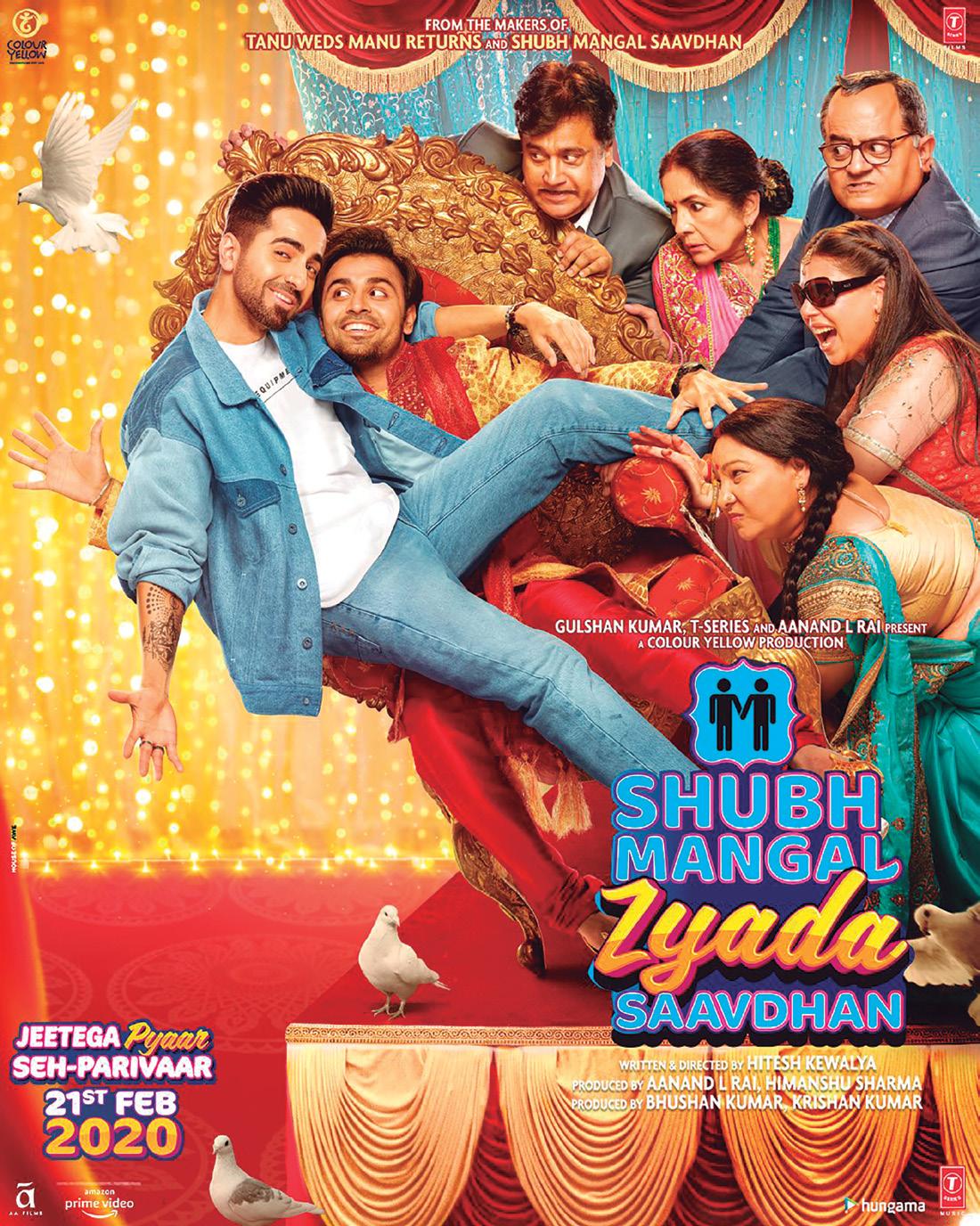
4 minute read
Shubh Mangal Zyada Saavdhan
Shubh Mangal Zyada Saavdhan (Be Extra-Careful of Marriage)
Jason Shawhan
Advertisement
Kartik Singh (Ayushmann Khurrana) and Aman “Guddu” Tripathi (Jitendra Kumar) are like lots of couples the world over. Aman is a tad high-strung but focused on keeping the balancing act of modern life going, while Kartik, the pragmatist/assimilationist who periodically asks for the intercession of superstar Amitabh Bachchan, is focused on making sure everybody is having a good time and that everyone is able to enjoy what all is happening around them.
What distinguishes them is that they’re the romantic leads in a Hindi-language film designed for a mass-market, mainstream audience, and that their being gay is not meant as something scandalous or laughable. Kartik and Aman are a recognizable couple. Even if you don’t speak Hindi and have never been out of North America, you recognize these men and how they relate to one another. In Hitesh Kewalya’s Shubh Mangal Zyada Saavdhan (Be Extra-Careful of Marriage), the gays have all the dignity, which is odd and refreshing in any comedy.
Here, Aman’s cousin Rajni (whom everyone calls Goggle for particularly cruel reasons) has finally landed a potential husband, so everyone is heading to a wedding. Initially not planning on attending, Aman and Kartik decide to go after all, when they help their friend Devika (Bhumi Pednekar) elope and have to flee a mob of people who ironically think they are pests to young women. So, it’s off to the wedding of Rajni and Ashok, with the two men keeping their relationship a secret.
Early on the film lays out its sly thesis—that the Indian economy runs on the engine of weddings. It does this without following through and saying that gay weddings would mean more money for the economy. But, let’s be honest ... people who let economics be their primary motivating factor want to think they came up with that themselves, anyway. It’s indicative of the film’s approaches to gay equality, and it will get around to all of them by the time the film is over. (There’s an endearing/exasperating/exhausting sequence toward the very end where a character decides to throw out some haphazard legal arguments and they are very slapdash, but the film want this sequence to hit like a karate kick, and the tonal disconnect is fascinating.)
But, of course, there is conflict, and Aman’s father Shankar sees our two heroes kissing in a dramatic train car, and things get tense. Shankar Tripathi (Gajraj Rao) is a monster. His physical violence is played for somewhat exaggerated laughs (he looks like a civil servant and is in no way physically intimidating, yet he is a stubborn, emotionally and physically violent man), but his continued response to any situation he cannot control completely is to oppress everyone around him. Long before we see the horrifying way he treats his family, we see the way he is playing God with his community’s ecosystem through genetically engineering black cauliflower, supposedly resistant to worms.

Everyone in this film has some sort of physical or emotional punching bag, except for Kartik. And, as we spend time with the Tripathis, we understand why it’s happened that Aman’s punching bag is himself.
The musical numbers, by Tanishk Bagchi and Vayu, are peppy and colorful and awesome, ranging from club bangers (“Ooh La La”) to tender heartfelt ballads (“Mere Liye Tum Kaafi Ho”). Kartik’s epic dance number (“Pyaar Tenu Karda Gabru”) at the wedding of Rajni and Ashok is superb, especially because it’s a man singing a love song to another man, which is still rare enough to be enthralling and inspiring. Oh, and disco/filmi music legend Bappi Lahiri pops up in the final remix musical number!
Shubh Mangal Zyada Saavdhan has been a surprise hit at the Indian box office, which is nice, even if the Modi regime and what they’ve been doing in Delhi and to India’s Muslim population is utterly horrifying, and the film has been playing internationally to varying responses.
For U.S. audiences, especially gay ones, it’s absolutely worth seeking out. Like the recent Georgian dance drama And Then We Danced, it’s a fascinating experience to see the bullet points of the traditional gay movie narrative incorporated into a culture and a cinema with different aesthetics and objectives than we usually get. (There’s a background otter in all of the Tripathi family gathering scenes dressed in what appears to be flannel, which is never less than hysterical.)
This is a film beholden to formulae which have proven themselves over the decades and uses those to help the culture evolve. So there is a rock solid foundation here—like a better-than-average Tyler Perry movie, or if Sordid Lives were shot like a real film. This is a fun way to spend an afternoon with friends, or perhaps your special someone.
Shubh Mangal Zyada Saavdhan is streaming on Amazon Prime.







